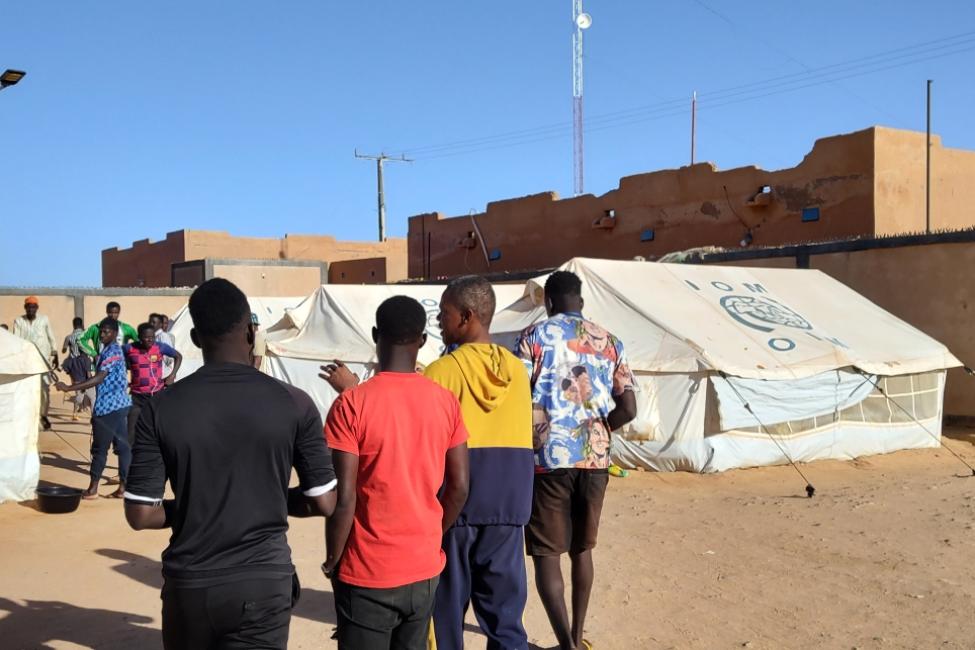-
Who We Are
WHO WE AREThe International Organization for Migration (IOM) is part of the United Nations System as the leading inter-governmental organization promoting since 1951 humane and orderly migration for the benefit of all, with 175 member states and a presence in over 100 countries. IOM has had a presence in Niger since 2016.
About
About
IOM Global
IOM Global
-
Our Work
Our WorkAs the leading inter-governmental organization promoting since 1951 humane and orderly migration, IOM plays a key role to support the achievement of the 2030 Agenda through different areas of intervention that connect both humanitarian assistance and sustainable development.
Cross-cutting (Global)
Cross-cutting (Global)
- Data and Resources
- Take Action
- 2030 Agenda
Agadez, 10 January 2023 – Ibrahima had been chosen as a country delegate by the close to 300 Malian migrants staying at the transit centre run by the International Organization for Migration (IOM) in the city of Agadez, in the heart of the Sahara Desert in Niger.
He left his home in southwest Mali and family behind in 2008 in search of a better life.
“In my village in Mali, I used to sell water. One day, I made enough money, so I decided to go to Morocco in the hopes of continuing by sea to Spain,” he recounts. “The boat journey was a disaster, some even died at sea. We were eventually returned to Morocco.”
But Ibrahima was determined to try again to make it to Europe, this time through Algeria. “I decided to walk the whole way. I ended up stranded at the border with Algeria,” he recalls.
In September 2022, with no means to continue or go back home, Ibrahima found his way to IOM's transit centre in Assamaka, a commune in the Agadez region. A few days later, he was transferred to IOM’s transit centre in Arlit before finally arriving at the centre in Agadez.
At the centre, migrants are provided with shelter, food, water, medical care, and psychosocial support. With over 1,000 people staying in the same place, tensions between migrants sometimes run high.
“After all we have been through, minor arguments sometimes lead to verbal or physical confrontations that need to be appeased or prevented so that we don’t become enemies,” Ibrahima explains.
To facilitate communication at the centre, a system of country representatives has been set up. Each community appoints a representative whose role is crucial in maintaining peace and promoting social cohesion amongst migrants.
“My compatriots have chosen me and it is with honour that I have accepted to represent them,” Ibrahima says.
“Most of them can't read or write and don't speak any French or English. It’s only their mother tongue that they speak and understand. We help them understand all the key messages shared by the staff.”
To facilitate the migrants’ voluntary return to their countries of origin, the delegates facilitate the logistics related to departures. They also promote the services available at the centre and sensitize migrants about the importance of recreational activities.
“With my background in culture, I even contribute to the activities. I came up with the initiative 'one migrant child, one book' that allows young migrants at the centre to access books.”
Ibrahima says that these are some of the memories from his migration journey that he is proud to take home and hopes that his work will live on through future delegates. In the meantime, he looks forward to returning to his family and children in Mali to restart his life.
“I think I have brought a valuable contribution to the transit centre. I tell my friends, the delegates, to keep persevering. It is a big responsibility, but it is rewarding.”
This story was written by Aïssatou Sy, Public Information Officer with IOM Niger, aisy@iom.int.


